United States congressional delegations from Alabama

These are tables of congressional delegations from Alabama to the United States House of Representatives and the United States Senate.
House of Representatives
Current members of the U.S. House of Representatives
List of members of the Alabamian United States House delegation, their terms in office, district boundaries, and the district political ratings according to the CPVI. The delegation has a total of 7 members, including 6 Republicans and 1 Democrat.
| District | Representative | Party | CPVI | Incumbency | District map |
|---|---|---|---|---|---|
| 1st |  Bradley Byrne (R-Mobile) Bradley Byrne (R-Mobile)
|
Republican | R+15 | Since January 7, 2014 | 
|
| 2nd |  Martha Roby (R-Montgomery) Martha Roby (R-Montgomery)
|
Republican | R+17 | Since January 3, 2011 | 
|
| 3rd |  Mike Rogers (R-Tuskegee) Mike Rogers (R-Tuskegee)
|
Republican | R+16 | Since January 3, 2003 | 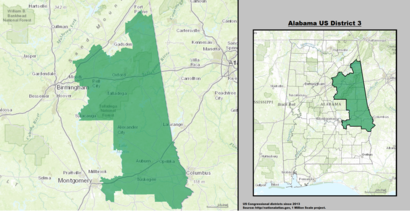
|
| 4th | 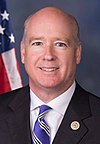 Robert Aderholt (R-Gadsden) Robert Aderholt (R-Gadsden)
|
Republican | R+28 | Since January 3, 1997 | 
|
| 5th | 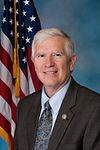 Mo Brooks (R-Huntsville) Mo Brooks (R-Huntsville)
|
Republican | R+17 | Since January 3, 2011 | 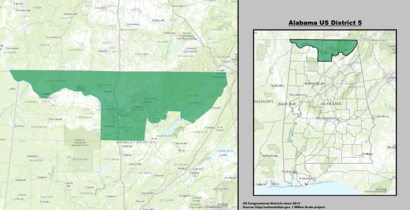
|
| 6th | 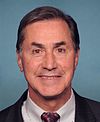 Gary Palmer (R-Vestavia Hills) Gary Palmer (R-Vestavia Hills)
|
Republican | R+28 | Since January 3, 2015 | 
|
| 7th |  Terri Sewell (D-Birmingham) Terri Sewell (D-Birmingham)
|
Democratic | D+20 | Since January 3, 2011 | 
|
Members' timeline (1818–present)
1818–1819: 1 non-voting delegate
Starting on January 29, 1818, Alabama Territory sent a non-voting delegate to the House.
| Congress | Delegate |
|---|---|
| 15th Congress (1817–1819) |
John Crowell (D-R) |
| 16th Congress (March 4, 1819 – December 14, 1819) |
Vacant |
1819–1823: 1 seat
After statehood on December 14, 1819, Alabama had one seat in the House.
| Congress | At-large district |
|---|---|
| 16th Congress (December 14, 1819 – 1821) |
John Crowell (D-R) |
| 17th Congress (1821–1823) |
Gabriel Moore (D-R) |
1823–1833: 3 seats
Following the 1820 census, Alabama had three seats.
| Congress | District | ||
|---|---|---|---|
| 1st | 2nd | 3rd | |
| 18th Congress (1823–1825) |
Gabriel Moore (J-DR) | John McKee (J-DR) | George W. Owen (J-DR) |
| 19th Congress (1825–1827) |
Gabriel Moore (J) | John McKee (J) | George W. Owen (J) |
| 20th Congress (1827–1829) | |||
| 21st Congress (1829–1831) |
Clement Comer Clay (J) | Robert Emmett Bledsoe Baylor (J) | Dixon Hall Lewis (J) |
| 22nd Congress (1831–1833) |
Samuel Wright Mardis (J) | ||
1833–1843: 5 seats
Following the 1830 census, Alabama had five seats. During the 27th Congress, those seats were all elected statewide at-large on a general ticket.
| Congress | District | ||||
|---|---|---|---|---|---|
| 1st | 2nd | 3rd | 4th | 5th | |
| 23rd Congress (1833–1835) |
Clement Comer Clay (J) | John McKinley (J) | Samuel Wright Mardis (J) | Dixon Hall Lewis (N) | John Murphy (J) |
| 24th Congress (1835–1837) |
Reuben Chapman (J) | Joshua L. Martin (J) | Joab Lawler (J) | Francis Strother Lyon (AJ) | |
| 25th Congress (1837–1839) |
Reuben Chapman (D) | Joshua L. Martin (D) | Joab Lawler (W) | Dixon Hall Lewis (D) | Francis Strother Lyon (W) |
| George Whitfield Crabb (W) | |||||
| 26th Congress (1839–1841) |
David Hubbard (D) | James Dellet (W) | |||
| 27th Congress (1841–1843) |
5 seats elected at-large on a general ticket | ||||
| 1st seat | 2nd seat | 3rd seat | 4th seat | 5th seat | |
| Reuben Chapman (D) | George S. Houston (D) | William Winter Payne (D) | Dixon Hall Lewis (D) | Benjamin Glover Shields (D) | |
1843–1863: 7 seats
Following the 1840 census, Alabama resumed the use of districts, now increased to seven.
1863–1873: 6 seats
Following the 1860 census, Alabama was apportioned six seats.
| Congress | District | |||||
|---|---|---|---|---|---|---|
| 1st | 2nd | 3rd | 4th | 5th | 6th | |
| 38th Congress (1863–1865) |
Vacant during American Civil War | |||||
| 39th Congress (1865–1867) | ||||||
| 40th Congress (1867–1869) | ||||||
| Francis William Kellogg (R) | Charles Waldron Buckley (R) | Benjamin White Norris (R) | Charles Wilson Pierce (R) | John Benton Callis (R) | Thomas Haughey (R) | |
| 41st Congress (1869–1871) |
Alfred Eliab Buck (R) | Robert Stell Heflin (R) | Charles Hays (R) | Peter Myndert Dox (D) | William Crawford Sherrod (D) | |
| 42nd Congress (1871–1873) |
Benjamin Sterling Turner (R) | William Anderson Handley (D) | Joseph Humphrey Sloss (D) | |||
1873–1893: 8 seats
Following the 1870 census, Alabama was apportioned eight seats. From 1873 to 1877, the two new seats were elected at large, statewide. After 1877, however, the entire delegation was redistricted.
1893–1913: 9 seats
Following the 1890 census, Alabama was apportioned nine seats.
1913–1933: 10 seats
Following the 1910 census, Alabama was apportioned ten seats. At first, the extra seat was elected at-large. Starting with the 1916 elections, the seats were redistricted and a tenth district was added.
| Congress | District | At-large | ||||||||
|---|---|---|---|---|---|---|---|---|---|---|
| 1st | 2nd | 3rd | 4th | 5th | 6th | 7th | 8th | 9th | ||
| 63rd Congress (1913–1915) |
George W. Taylor (D) | S. Hubert Dent Jr. (D) | Henry D. Clayton (D) | Fred L. Blackmon (D) | J. Thomas Heflin (D) | Richmond P. Hobson (D) | John L. Burnett (D) | William N. Richardson (D) | Oscar W. Underwood (D) | John Abercrombie (D) |
| William Oscar Mulkey (D) | Christopher Columbus Harris (D) | |||||||||
| 64th Congress (1915–1917) |
Oscar Lee Gray (D) | Henry B. Steagall (D) | William B. Oliver (D) | Edward B. Almon (D) | George Huddleston (D) | |||||
| 65th Congress (1917–1919) |
10th district | |||||||||
| William B. Bankhead (D) | ||||||||||
| 66th Congress (1919–1921) |
John McDuffie (D) | |||||||||
| William B. Bowling (D) | Lilius Bratton Rainey (D) | |||||||||
| 67th Congress (1921–1923) |
John R. Tyson (D) | Lamar Jeffers (D) | ||||||||
| 68th Congress (1923–1925) |
Miles C. Allgood (D) | |||||||||
| J. Lister Hill (D) | ||||||||||
| 69th Congress (1925–1927) | ||||||||||
| 70th Congress (1927–1929) | ||||||||||
| LaFayette L. Patterson (D) | ||||||||||
| 71st Congress (1929–1931) | ||||||||||
| 72nd Congress (1931–1933) | ||||||||||
1933–1963: 9 seats
Following the 1930 census, Alabama was apportioned nine seats.
1963–1973: 8 seats
Following the 1960 census, Alabama was apportioned eight seats.
| Congress | Statewide at-large on a general ticket | |||||||
|---|---|---|---|---|---|---|---|---|
| 1st seat | 2nd seat | 3rd seat | 4th seat | 5th seat | 6th seat | 7th seat | 8th seat | |
| 88th Congress (1963–1965) |
George Huddleston Jr. (D) | George M. Grant (D) | George W. Andrews (D) | Kenneth A. Roberts (D) | Armistead I. Selden Jr. (D) | Albert Rains (D) | Carl Elliott (D) | Robert E. Jones Jr. (D) |
| Congress | District | |||||||
| 1st | 2nd | 3rd | 4th | 5th | 6th | 7th | 8th | |
| 89th Congress (1965–1967) |
Jack Edwards (R) | William Louis Dickinson (R) | George W. Andrews (D) | Arthur Glenn Andrews (R) | Armistead I. Selden Jr. (D) | John Hall Buchanan Jr. (R) | James D. Martin (R) | Robert E. Jones Jr. (D) |
| 90th Congress (1967–1969) |
William Flynt Nichols (D) | Tom Bevill (D) | ||||||
| 91st Congress (1969–1971) |
Walter Flowers (D) | |||||||
| 92nd Congress (1971–1973) | ||||||||
| Elizabeth B. Andrews (D) | ||||||||
1973–present: 7 seats
Since the 1970 census, Alabama has been apportioned seven seats.
Living former Members of the U.S. House of Representatives
As of October 2017[update], there are sixteen living former members of the U.S. House of Representatives.
| Representative | Term of office | District | Date of birth (and age)
|
|---|---|---|---|
| Jack Edwards | 1965–1985 | 1st | September 20, 1928 |
| Ronnie Flippo | 1977–1991 | 5th | August 15, 1937 |
| Richard Shelby | 1979–1987 | 7th | May 6, 1934 |
| Ben Erdreich | 1983–1993 | 6th | December 9, 1938 |
| Sonny Callahan | 1985–2003 | 1st | September 11, 1932 |
| Glen Browder | 1989–1997 | 3rd | January 15, 1943 |
| Robert E. Cramer | 1991–2009 | 5th | August 22, 1947 |
| Earl F. Hilliard | 1993–2003 | 7th | April 9, 1942 |
| Terry Everett | 1993–2009 | 2nd | February 15, 1937 |
| Spencer Bachus | 1993–2015 | 6th | December 28, 1947 |
| Bob Riley | 1997–2003 | 3rd | October 3, 1944 |
| Artur Davis | 2003–2011 | 7th | October 9, 1967 |
| Jo Bonner | 2003–2013 | 1st | November 19, 1959 |
| Parker Griffith | 2009–2011 | 5th | August 6, 1942 |
| Bobby Bright | 2009–2011 | 2nd | July 21, 1952 |
United States Senate
Current Senators
since January 3, 1987
since January 3, 2018
Senators' timeline (1818–present)
Living former U.S. Senators
As of July 2018[update], there are three living former U.S. Senators.
| Senator | Term of office | Class | Date of birth (and age) |
|---|---|---|---|
| Donald W. Stewart | 1978–1981 | 3 | February 4, 1940 |
| Jeff Sessions | 1997–2017 | 2 | December 24, 1946 |
| Luther Strange | 2017–2018 | 2 | March 1, 1953 |
Key
See also
References
- ^ "The national atlas". nationalatlas.gov. Archived from the original on February 22, 2014. Retrieved February 2, 2014.
{{cite web}}: Unknown parameter|deadurl=ignored (|url-status=suggested) (help) - ^ Seat was contested by James Q. Smith and declared vacant; the original representative won back his own seat.
- ^ Successfully contested the election of the representative that was replaced.
- ^ Parker Griffith was elected as a Democrat, but switched his party affiliation to Republican on December 22, 2009.
- ^ a b Seat was vacant due to failure of legislature to elect a senator by the beginning of the congress.
- ^ George S. Houston presented credentials as a senator-elect on February 9, 1866, but was not permitted to take his seat, Alabama having not been re-admitted to the Union.
- ^ The seat was vacant from August 8, 1913, to May 11, 1914. Henry D. Clayton was appointed to the U.S. Senate to fill the vacancy caused by the death of Joseph F. Johnston in 1913, but his appointment was challenged and withdrawn. Franklin Potts Glass Sr. was also appointed to the seat, but the U.S. Senate voted not to seat him.


